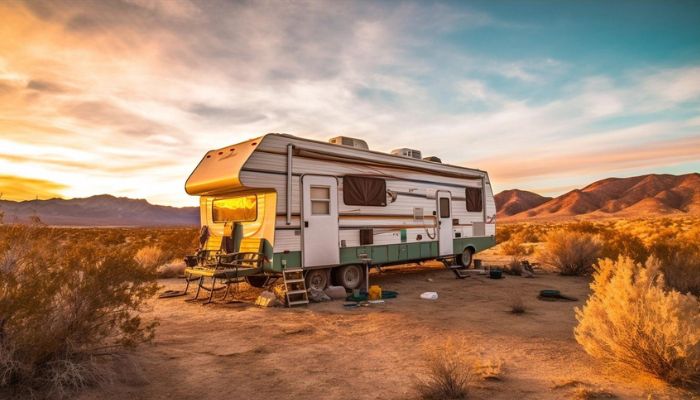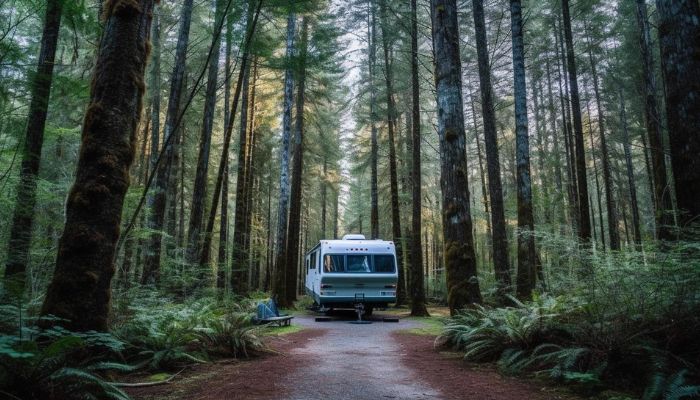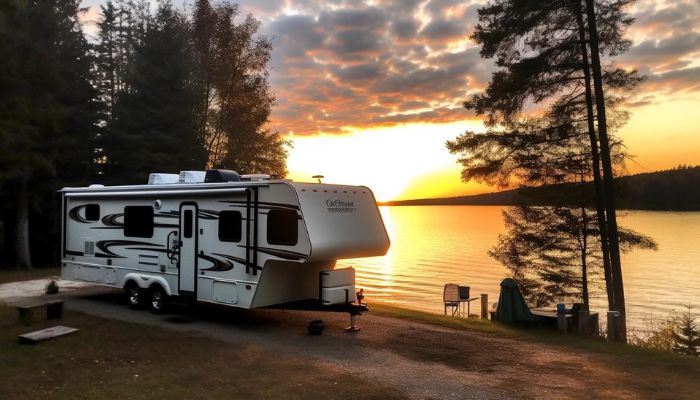If you stay at a dry campsite, your trip will be an adventure. Why? because you’re going camping and getting to observe nature for what it is. While dry camping, you will not have access to running water or electrical hookups. A tent or an RV without any hookups can be used for this type of basic camping.
The benefits of dry camping are significant because you will learn that you can live peacefully without many of the things you previously thought were necessary. It’s amazing how liberated you feel when you quit using technology. By actually experiencing nature without all the distractions, one can make big changes in attitude and even confidence.
It may surprise you to hear that dry camping offers the added benefit of being less crowded, making it excellent for social solitude. You also have more alternatives for reservations because the sites are usually the last to fill up.
Table of Contents
What Exactly is Dry Camping?
Dry camping, also known as boondocking, is staying in an RV, camper, or motorhome outside of a typical campground with no hookups (neither electricity nor water). Dry campers generally set up camp for free on both public and private property (with the owner’s permission). This type of conduct is known as “dispersed camping” in national parks and woods.
In addition to camping on private property, dry camping frequently comprises establishing a camp in a big-box store parking lot, the most popular of which being those of Walmart and Cabela’s. Many dry campers prefer this type of camping since it allows them to travel further into the countryside and away from society.
What Is the Difference Between Boondocking and Dry Camping?
Boondocking is another term for off-grid dry camping. There is, however, a distinction between dry camping and boondocking.
While boondocking is synonymous with dry camping, the reverse is not always true.
Both terms apply to unhooked camping, while “boondocking” refers to camping outside of RV parks or other developed campgrounds with designated camping areas. Dry camping is available at a developed campsite, usually in a state, provincial, or national park, but without water, power, or sewer hookups.
Is Dry Camping Legal?
The major question you may have about dry camping is if it is legal. You might be nervous about parking your RV somewhere overnight or setting up camp in pristine settings, especially if no one knows you’re there.
Although it is legal to camp in private areas, you must always obtain the owner’s permission first. Otherwise, you run the risk of getting into legal trouble.
Check the regulations to discover if you’re allowed to camp in a public location and if there are any restrictions.
For example, before filling up your RV and driving to your destination, be sure you have permission to dry camp at a National or State park. Furthermore, you must stay within the permitted dispersed camping area.
Advice for Newcomers to Dry Camping
If you are not used to RVing without hookups, dry camping may appear to be a challenging task. However, with a few precautions and planning ahead of time, you can quickly master dry camping. Follow these basic rules to ensure a pleasant and uncomplicated experience.
Reduce Your Water Usage
Water is the most important item to have on a dry camping trip. Knowing how much fresh water your fresh water tank can hold will help you estimate how long you can go camping without running out of drinking water. This knowledge is excellent for planning and knowing if you should restrict your water supply if you want to dry camp for an extended period of time. You must conserve water when dry camping because you cannot always rely on being able to refill your water tanks nearby.
You can save water by taking shorter showers (or using an RV shower head), turning off the water while brushing your teeth, and washing dishes in a pot of water. If your water tank becomes low and you still have time before the journey is over, you may need to minimize the amount of water you consume. However, take care not to become dehydrated. If your water supply is inadequate, you should cut your vacation short.
Conserve Grey Tank Capacity
Grey water is used to replace discarded shower and sink water. The more water you use for showers, teeth brushing, hand washing, and dishwashing, the faster your gray water tank will fill up. Graywater conservation is just as important as freshwater conservation. The capacity of the grey tank will also be listed in your RV’s owner’s manual. Keep in mind that greywater tanks are often smaller than freshwater tanks.
Before going dry camping, make sure your grey tank is empty. You can empty it (for a price) at a number of petrol stations, travel agencies, state parks, national parks, and exclusive campgrounds. The Sanidumps app can help you find locations to empty your tanks before going camping. Similarly, you’ll need to find a place to empty your tanks before returning home or to your next location.
Keep a close check on your tank meters to see how filled your grey tank is. When dry camping, do not overfill your tanks because it is never acceptable to discard gray water. Reduce your water usage if the tanks fill up faster than expected to ensure you have enough tank space for the remainder of your stay.
Manage Black Tank Capacity
The black tank is even smaller than the gray tank. It fills up when someone uses the restroom. Because of its diminutive size, it fills up much faster. Your toilet will break down if you do not dump it when it reaches capacity. Before going on a dry camping trip, make sure you clean your black tank on a regular basis.
Generate Electricity
Power is the most difficult utility to manage while dry camping. The house batteries in your RV act as a power reserve and can be recharged in a variety of ways. When you drive and plug into shore power, your house batteries are charged. If you just want to dry camp for one night, you may have enough electricity saved to last till you move on to your next destination. If you need to recharge your batteries while dry camping, you have numerous possibilities.
Many motorhomes and toy haulers have an internal gas-powered generator. This can be used to charge batteries and electronic gadgets. If your RV does not come with one, you can purchase a portable generator and link it to your batteries. Remember to utilize generators with caution because they are rather noisy when in use. To avoid irritating your neighbors, only operate your generator during acceptable times after obtaining permission from your host.
If you intend to do a lot of dry camping, it could be a good idea to invest in a solar power kit. You may install these yourself if you have electrical knowledge, or you can hire a professional. Although there is often a significant initial outlay, frequent dry camping results in financial savings.
Manage Waste Disposal
Trash and garbage can also be an issue when dry camping. Because you are not at a campsite with dump stations and dumpsters, you must limit the amount of waste you generate. You can go to a neighboring business and ask whether it’s okay to throw a couple of bags of trash in their dumpster to keep junk from accumulating in or around your RV. They usually don’t mind if you only have one or two bags.
Practice Makes Perfect
Dry camping entails a minor learning curve. If you are new to this, it is best to start with short journeys. A one-night stay at a Walmart or Harvest Host site would be a good place to start. You can save power, water, and grey/black tank space by gradually expanding your excursions to two or three nights. It will become easier as you practice. Many “professional” dry campers can go 10-14 days without refilling or emptying their tanks. Although this may be more than you intended to dry camp for, most people can easily go three or four nights with practice.
Dry camping might be intimidating and difficult if you’ve never done it before. Most people believe it is well worth foregoing connections in order to spend the night in beautiful Harvest Host locations, beautiful dispersed camping areas, and the occasional, convenient Walmart lot. If you’ve never been dry camping before, these tips will help you prepare for your first trip because practice makes perfect. Because of the money you’ll save, the memories you’ll make, and the shared experiences, you’ll be planning your next dry camping trip sooner rather than later.
Dry Camping Tips Video
The Advantages of Dry Camping
Camping without full hookups is usually less expensive, though it is not always free. Being free of hookups broadens your camping possibilities. You can take advantage of uncommon choices such as camping at a recognized national forest campground tucked away in the woods near a lake or staying at breweries, farms, or golf courses through Harvest Hosts.
Nearly every major city, including Los Angeles and Houston, has dry camping parks that offer inexpensive lodging. It’s a great way to spend time with friends or family members while still having access to your own bed at night.
You may need to spend the night at a parking lot or rest stop after a long day of driving to your destination. While not always enjoyable, this option is convenient because it does not necessitate a detour or a campground reservation.
Being self-sufficient is essential when dry camping. It’s not as complicated as it appears, and you probably already have everything you need.
Advantages
- It can be completely free. RV camping typically costs between $30 and $100 a night, with private and busier parks charging more.
- It has less restrictions. Because there are no approved campsites, you can park wherever you can get the best access to water or the best view. The lack of reservations and lotteries is an added plus. There is always a space for you.
- It has a more exclusive feel about it. If your ideal camping trip comprises only you and your camping buddies in a beautiful natural area, this may be the finest option.
Disadvantages
- There could be some legal ambiguity. Unfortunately, you cannot simply pull over and set up camp anywhere. You must be informed of any laws before deciding on a place.
- More work is required. If there is no running water or electricity, you can only meet your basic needs with campfires, propane generators, solar power, and so on.
- More products must be transported. Everything you’ll need, including a large supply of water, an emergency supply pack, and off-grid power, can be difficult to transport.
Final Thoughts
If you’ve ever wondered what it means to “dry camp,” you’ve come to the right place.
Dry camping is a terrific way to rough it if you want to avoid RV resorts and immerse yourself in nature instead. However, be warned that it may be difficult.
This is why it is critical to plan ahead of time, especially if you have never gone dry camping before.



